
Here Comes the Night is the ninth studio album by singer-songwriter Barry Manilow, released in 1982 by Arista Records. The United Kingdom release went by the title I Wanna Do It With You. It received a Gold certification from the RIAA. The album was recorded at Sound City Recording Studios in Van Nuys, California.
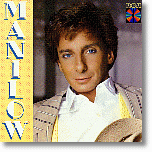
Manilow is the eleventh studio album by singer-songwriter Barry Manilow, released in 1985. It was his first album to miss the Top 40 and fail to earn a gold certification. Many feel it was due to the prominence of synthesizers, a departure from his renowned piano ballads. This album was one of Manilow's two albums with RCA Records.
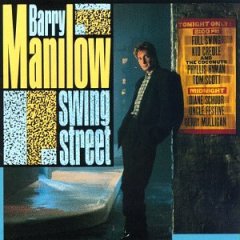
Swing Street is the twelfth studio album by composer and singer Barry Manilow, released in 1987. Three of the tracks on the album featured Manilow in a duet with another singer. The tracks were recorded at various locations. This album marks Manilow's return to the Arista Records label from RCA Records, where he had two releases from 1985 to 1986 including Manilow and the soundtrack for the musical film Copacabana. The title of the album refers to 52nd Street in Manhattan, between 5th and 6th Avenues, which was the jazz mecca during the late 1930s and early 1940s.

Nobody's Angel is an album by the American country music singer Crystal Gayle. Released in September 1988, the album peaked at number 63 on the Billboard Country Albums Chart.
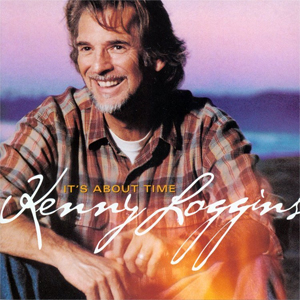
It's About Time is the twelfth studio album released by American singer-songwriter Kenny Loggins. Released in 2003, it was his first non-Christmas, non-children's album since 1997's The Unimaginable Life as well as his first following termination from Columbia Records while working on the album. Besides Loggins, several other noteworthy musicians co-wrote and performed on the album. These include frequent Loggins cohort Michael McDonald, as well as fellow soft-rocker Richard Marx and country singer Clint Black.
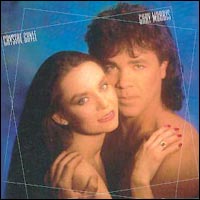
What If We Fall in Love is the only duet album by American country music artists Crystal Gayle and Gary Morris, released in November 1986. Three of the album's tracks found positions on the Billboard Hot Country Singles chart. Chronologically, they were "Makin' Up for Lost Time", which reached the number 1 position, "Another World", which was a number 4 hit, and "All of This and More", which rose to number 26. The album itself rose to number 25 on the Top Country Albums chart.

Finder of Lost Loves is a studio album by American singer Dionne Warwick. It was released by Arista Records on January 24, 1985 in the United States. Warwick worked with Richard Landis, Barry Manilow, and Stevie Wonder on the majority of the album, though she also reunited with Burt Bacharach for the first time in over a decade. The album includes a cover of the Bee Gees song "Run to Me" performed as a duet with Manilow as well as two duets with Wonder, which had previously been released on Wonder's soundtrack album to The Woman in Red. Finder of Lost Loves peaked at number 106 on the US Billboard 200 chart.

When Love Finds You is the sixth studio album from American country music artist Vince Gill. It was released in 1994 on MCA Nashville. It features the singles "Whenever You Come Around," "What the Cowgirls Do," "When Love Finds You," "Which Bridge to Cross ," "You Better Think Twice" and "Go Rest High on That Mountain."

Oasis is Roberta Flack's first solo album of newly recorded songs since 1982's I'm the One. Released 1 November 1988, Oasis features the number-one U.S. singles, "Oasis" (R&B), and "Uh-uh Ooh-ooh Look Out ".

Born to Love is a 1983 studio album of duets by American singers Peabo Bryson and Roberta Flack. It was released by Bryson's label Capitol Records on July 22, 1983, in the United States. The album yielded the hit single "Tonight, I Celebrate My Love", written by Gerry Goffin and Michael Masser. The track "Maybe" was written and recorded for the film Romantic Comedy (1983).

Roberta is Roberta Flack's fourteenth album, released in 1994. It consists of cover versions of jazz and soul standards. It was also her final album for Atlantic Records after twenty five years with the label since her debut.

Christmas Wish is the twenty-second studio album by British-Australian singer Olivia Newton-John. It is the second original album of Christmas music recorded by Newton-John after 'Tis the Season with Vince Gill, and the compilation partly from that, The Christmas Collection. It is her second album produced by Amy Sky. It features versions of classic Christmas songs and guest appearances from Barry Manilow, Jon Secada, Michael McDonald and others. In 2008, the album was re-released as a Target exclusive and included the bonus track "In the Bleak Midwinter".

Shapes and Patterns is the fifth studio album by British pop group Swing Out Sister. It was first released in Japan in March 1997 on Mercury Records, and in Europe and the United States the following year. Producer Paul Staveley O'Duffy, who co-wrote half of the songs on the album, was back at the helm. As an orchestra was once again employed, the lush arrangements characteristic of Kaleidoscope World (1989) resurfaced. The album features the track "Now You're Not Here" which was used as the theme to the Japanese programme Mahiru No Tsuki, as well as a reworked version of "Better Make It Better" which had featured on their previous studio album, The Living Return (1994). The album was promoted with the singles "Somewhere in the World" and "We Could Make It Happen."
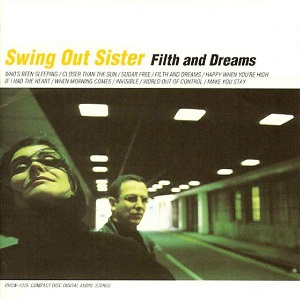
Filth and Dreams is the sixth studio album by British pop group Swing Out Sister. It was released in Japan in March 1999, and unlike all of their previous studio albums, has not seen release in any other country. This album was their first to not contain any singles.
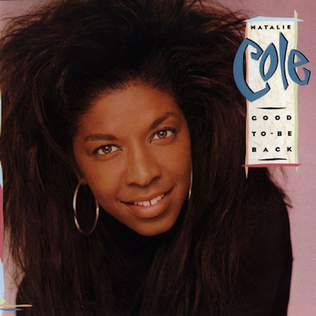
Good to Be Back is the twelfth studio album by American singer Natalie Cole. Released in May 1989 by EMI USA, it contains the hit singles "Miss You Like Crazy" and "I Do".
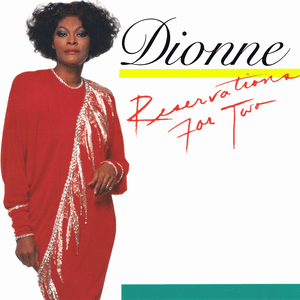
Reservations for Two is a studio album by the American singer Dionne Warwick. It was recorded during the spring of 1987 and released on July 30 of that year. Her eighth album for Arista Records, it was again executive produced by label head Clive Davis. Warwick reteamed with Barry Manilow and the duo Burt Bacharach and Carole Bayer Sager to work on the album, while Kashif, Jerry Knight, Howard Hewett and Smokey Robinson also contributed to the tracks.

Something to Talk About is the twenty-second studio album by Canadian country pop artist Anne Murray. It was released by Capitol Records in 1986. The album is so named after the Shirley Eikhard-composed song "Something to Talk About", which Murray had wanted to record for the album but was rejected by her producers; Bonnie Raitt went on to have a huge hit with the song.

As I Am is the twenty-fourth studio album by Canadian country pop artist Anne Murray. It was released by Capitol Records in 1988. The album peaked at number 29 on the Billboard Top Country Albums chart.

Love Remembers is the 28th album by George Benson, released June 8, 1993. This album charted at No. 1 on Billboard's Contemporary Jazz Albums chart, as well as No. 7 on its Jazz Albums chart.
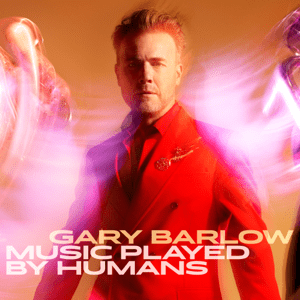
Music Played by Humans is the fifth solo studio album by British singer-songwriter Gary Barlow. The album was released by Polydor Records on 27 November 2020 and is Barlow's first solo album in seven years, following Since I Saw You Last in 2013. The album's lead single, "Elita" features both Michael Bublé and Sebastián Yatra, and was released on 30 September 2020.




















